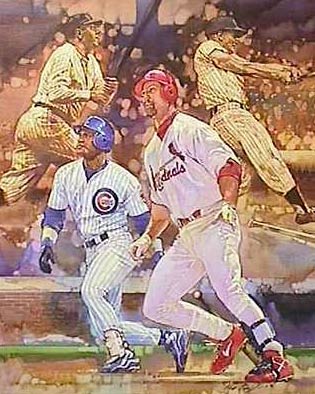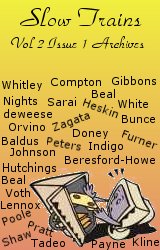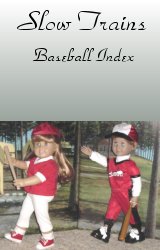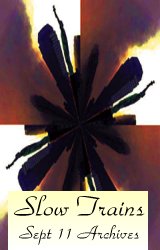
Lewis in the Bush League
by Jeff Beresford-Howe
As I was watching the A's sweep the Rangers out of town this weekend, I thought, God, it must be depressing to be a baseball fan in Texas. Today, as the season ground to a close on a gorgeous California September afternoon, they had three catchers in the line-up, a first baseman at third, another first baseman in right, a thief in center field and the greatest player alive at shortstop, a man who, besides his superlative play, provides regular occasions of melancholy as he stares into the middle distance and wonders how this could have happened to him.
All these guys can hit, in a graceless, beer-league, home runs-are-the-only-thing-that-counts kind of way, but the Rangers don't have one guy -- not one -- who can throw a ball crooked enough to regularly miss bats. So all their games are like the one I saw today, interminable seven to five affairs in which the defining characteristic is an agonizing parade of missed opportunities.
The Rangers were recently and famously owned by the man who is now president of the United States. No, I'm sorry, "owned" is not the word. The man parlayed his family connections and a few thousand dollars into an interest as managing partner. He exited with millions, enough cash to make A-Rod blush. (Sounds like a lot of stories we've heard from Texas lately, doesn't it?)
The president's chief contribution to the team seems to have been a successful plan to con the City of Arlington out of millions to build a new baseball stadium, a blight, an arcade-like Frankenstein monster that looks like the plans for every other stadium in the majors fell into a blender and were taped back together by a half-bright child. (It's this "entrepreneurial spirit" that the president was referring to as his chief business success during his beknighted 2000 campaign.)
Regardless of how you feel about the president's business ethics or success or lack of same, there's no question about how he left the franchise on the field: after his initial success in focusing on the stadium, the team drifted, derelict of direction, immune to the hard work and concentration that it takes to develop pitching in particular. (Hey, that sounds familiar too, doesn't it?) The Rangers haven't produced a good major league pitcher in over a generation, almost all of their considerable hitting talent comes from elsewhere, their payroll is Dadaesque and their scouting department is a joke among the cognoscenti. They are a team that has settled into last place, and, from the looks of their competition in the AL West, is going to stay there for quite some time.
If they manage to crawl out of the cellar, it might be because of twenty-four-year-old right-hander Colby Lewis, who pitched for the Rangers Saturday in Oakland. Since this is the Rangers and they buy into those Texas myths with every darn tootin' breath, the only two pitchers that matter are Nolan Ryan and Roger Clemens. The Rangers are hooked on guys who fit those templates. Lewis is a Clemens guy, big -- 6'4", like Roger -- and stocky, with thighs like tree trunks, and the Rangers made him their first pick in the draft in 1999. He doesn't throw quite as hard as Clemens, but he likes to pitch high in the strike zone the way Roger does.
Like Clemens, Lewis has racked up the Ks wherever he goes, starting at Bakersfield JC -- of course it was Bakersfield; it's more Texas there than California -- and continued to do so in the Florida State League, the Appalachian League and the Texas League, where he found another trait in common with Roger: he led the league in hit batsmen.
Lewis began the year moving straight from AA ball to the Rangers' bullpen -- the first time he'd ever pitched in relief -- where, after a tidy Opening Night debut in Oakland, he proceeded to get bombed with regularity. The Rangers sent him down to Oklahoma City, where he returned to starting and dominated the league. They brought him up again in late June, and of course, it being the Rangers, their rotation in an utter shambles and any hope of the pennant race long gone, they put Lewis back out in the bullpen. The Orioles and the Twins lit him up but good, and by the end of July he was a mess, giving up almost eight runs a game and pitching only sporadically. Another trip to Oklahoma City got the same excellent results the first one did, and so the lightbulb finally went on: hey, let's try Colby on the big club as a starting pitcher.
He's made three starts since then, pitching very well against Seattle at home and then faltering slightly against Seattle and Oakland. Both times, he was undone by two problems common to Clemens: throwing a ton of pitches and letting umpires get to him. Against the A's, he was good for five innings, then got riled by a tough ball-four call on a pitch to David Justice. ("Son, Mr. Justice will let you know if it's a strike by swinging at it.") Lewis then walked Randy Velarde, Ramon Hernandez and Mark Ellis -- all three of them the kind of right-handed hitters he should be eating for lunch -- to singlehandedly knock himself out of the game.
Whether Lewis is ultimately as talented as Roger Clemens -- who is, despite his obvious personality problems, one of the greatest pitchers of his generation -- is unknowable at this point, but it's fair to ask whether Lewis will get a chance to star or be another one of the president's legatees on the Rangers: a victim of a team that has always prized selling and opportunism over hard work and the little things that make for success.
©2002 by Jeff Beresford-Howe


 Slow Trains, Volume 1 in print
Slow Trains, Volume 1 in print



